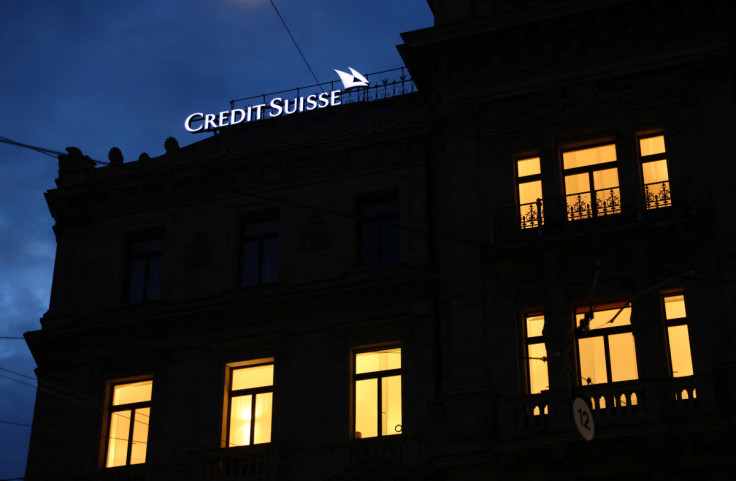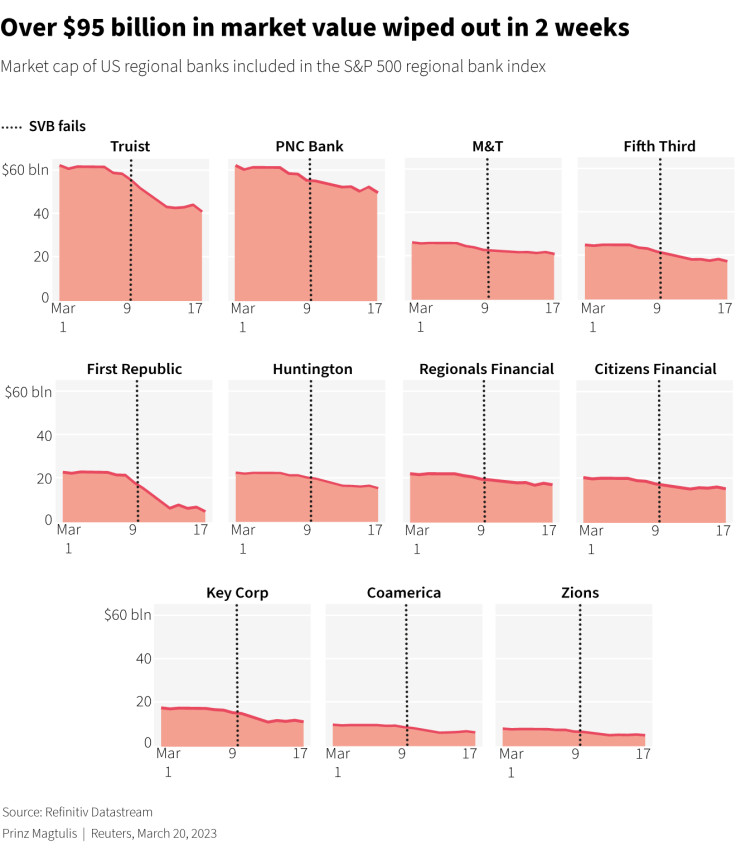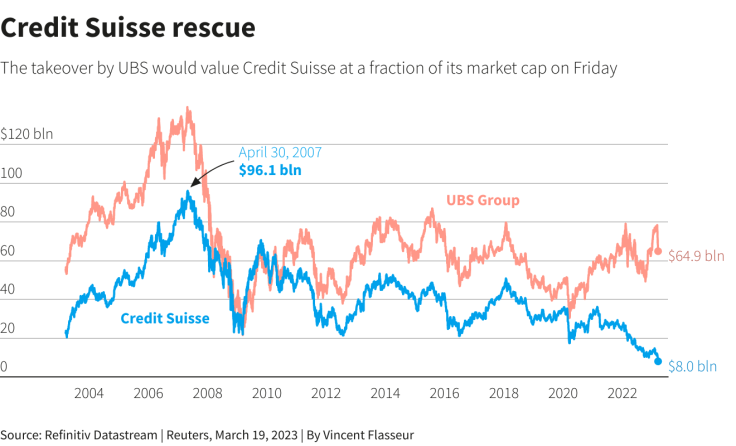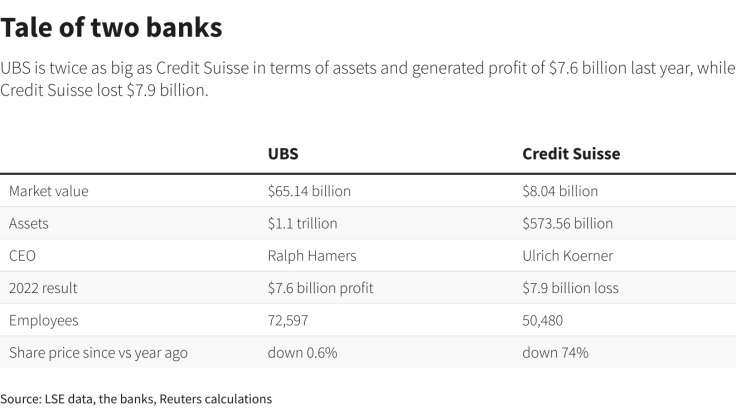Fed, US Banks In Focus As Mood Improves On Credit Suisse Rescue

Investors on Tuesday took some heart from the rescue of troubled lender Credit Suisse by its Swiss rival UBS, though concerns lingered about the risk of shockwaves further damaging credit markets and smaller U.S. banks.
Attention is now on this week's meeting of the U.S. Federal Reserve, with traders wondering whether the central bank's relentless rate hikes - blamed by some for sparking the crisis - might be at an end.
The 3 billion Swiss franc ($3.2 billion) deal for Credit Suisse, once worth more than $90 billion and the biggest name caught in the turmoil, was engineered by Swiss regulators and announced on Sunday.
Asian shares lifted off their lows as the move assuaged the worst fears of systemic contagion in the financial system.
"The current situation in U.S. regional banks and Credit Suisse has raised concerns about contagion risk," said Grace Tam, chief investment advisor Hong Kong at BNP Paribas Wealth Management. "This time, major central banks have been reacting very swiftly to backstop liquidity. U.S. officials are also studying ways to temporarily guarantee all bank deposits if the banking crisis expands."
However, she expected near-term investor sentiment will remain volatile.
In a sign of business continuity, Credit Suisse on Tuesday kicked off its three-day annual Asian Investment Conference in Hong Kong, which draws participation from top executives at regional companies, among others.
Credit Suisse CEO Ulrich Koerner, who was expected to attend the conference, however, dropped out and the event was closed to media after the weekend rescue.
The demise of Credit Suisse was triggered by the collapse of U.S. mid-sized lenders Silicon Valley Bank and Signature Bank, and while European bank shares rebounded from recent losses, investors still fretted about other ticking bombs in the banking system.
Shares in First Republic Bank halved on Monday on worries that last week's $30 billion infusion of capital would not be enough.
JPMorgan Chase & Co CEO Jamie Dimon is leading talks with other big banks on new efforts to stabilise First Republic with a possible investment into the lender, the Wall Street Journal reported, citing people familiar with the matter.
JPMorgan and First Republic declined to comment on the report. A spokesperson for First Republic pointed to an earlier statement where the bank said it was "well-positioned to manage short-term deposit activity".
Wall Street's S&P 500 banks index recovered 0.6%, and other regional U.S. lenders rose. PacWest Bancorp jumped almost 11% after saying deposit outflows had stabilised and its available cash exceeded total uninsured deposits.
Policymakers from Washington to Europe have repeatedly stressed that the current turmoil is different from the global financial crisis 15 years ago, pointing to banks being better capitalised and funds more easily available.
(GRAPHIC- Over $95 billion in market value wiped out in 2 weeks:

)
Still, top central banks promised at the weekend to provide dollar liquidity to stabilise the financial system to prevent the banking jitters from snowballing into a bigger crisis.
In a global response not seen since the height of the pandemic, the Fed said it had joined central banks in Canada, Britain, Japan, the euro zone and Switzerland in a co-ordinated action to enhance market liquidity.
Traders have now increased their bets the Fed will pause its hiking cycle on Wednesday to try to ensure financial stability, but on the whole remain split over whether the Fed will raise its benchmark policy rate.
"The banking sector's near-death experience over the last two weeks is likely to make Fed officials more measured in their stance on the pace of hikes," said Standard Chartered's head of G10 FX research, Steve Englander.
Investor focus in Europe shifted to the massive blow some Credit Suisse bondholders will take, prompting euro zone and UK banking supervisors to try to stop a rout in the market for convertible bank bonds.
The regulators said owners of this type of debt would only suffer losses after shareholders have been wiped out - unlike at Credit Suisse, whose main regulators are in Switzerland.
Lawyers are talking to a number of AT1 bond holders about possible legal action, law firm Quinn Emanuel Urquhart & Sullivan said on Monday.
(GRAPHIC-Credit Suisse rescue:

)
The deal will make UBS Switzerland's only global bank. It will also make the Swiss economy more dependent on a single lender, and prompted sharp criticisms from the countries two biggest political parties.
"What has happened is terrible for the credibility of Switzerland," said Roger Nordmann, leader of the Social Democrats. "It's a warning shot for Switzerland about having banks which are just too big."
(GRAPHIC- Tale of two banks:

)
($1 = 0.9280 Swiss francs)
© Copyright Thomson Reuters 2024. All rights reserved.





















